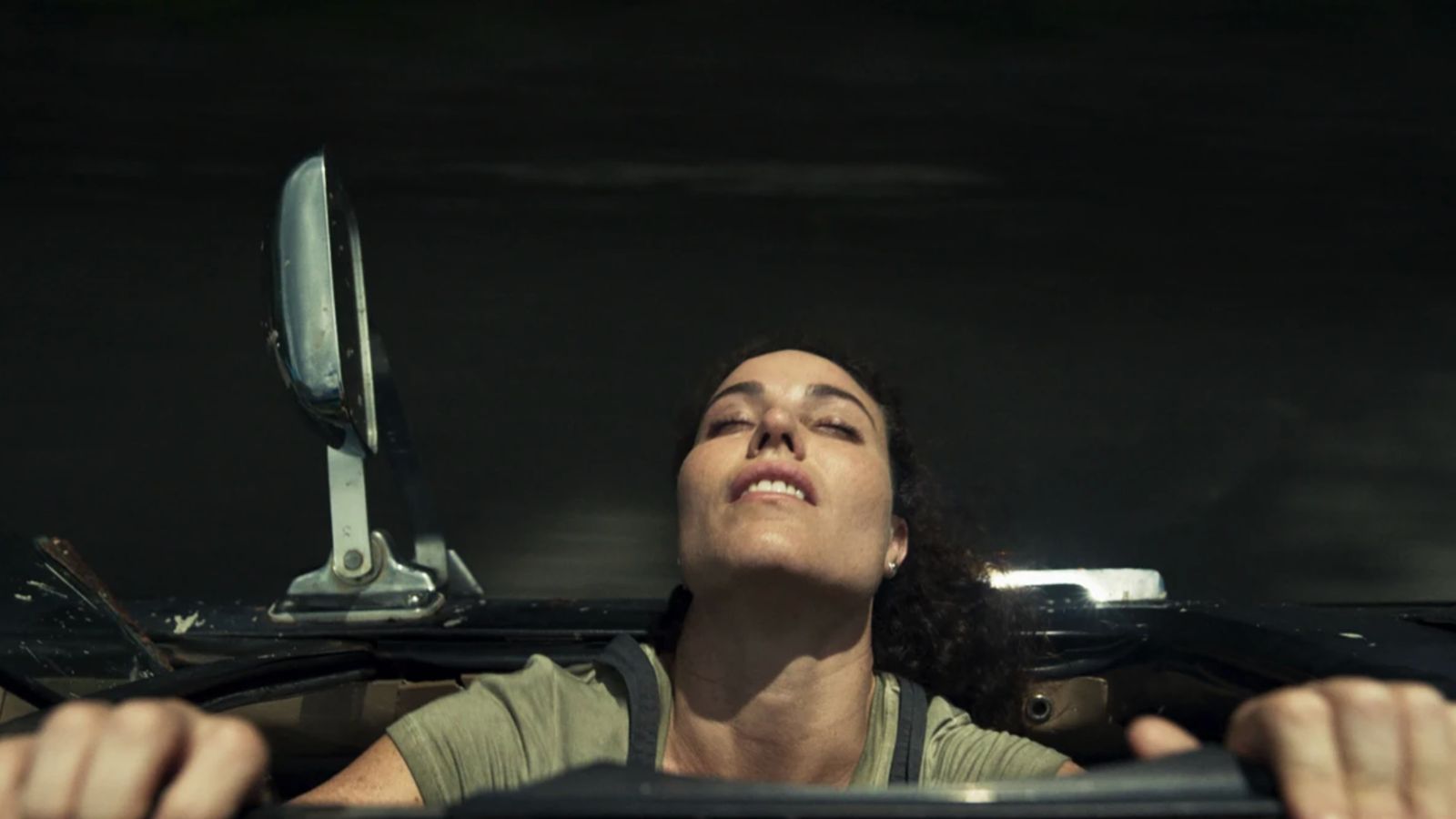A body and an island become sites of resistance in Glorimar Marrero Sánchez’s The Fishbowl, a fitfully incendiary, entrancing portrait of a woman engaged in a two-front war. Her name’s Noelia (Isel Rodríguez), a thirty-something Puerto Rican artist living in San Juan with her partner Jorge (Maximiliano Rivas). At the outset we’re told Noelia’s had cancer, and now that the illness has returned she refuses treatment to seek refuge in her native island of Vieques, a 40-minute ferry ride from the capital. What we aren’t told, but the film persuasively suggests, is that her disease might have been caused by the toxic emissions left by six decades’ worth of American weapons testing on her home turf. Written by Marrero Sánchez, The Fishbowl mines an unsealed wound in the US territory’s history; as The Atlantic grimly revealed in a 2016 exposé, cancer rates in Vieques are abnormally higher than the rest of Puerto Rico, and the US Navy, long after leaving the island in 2003, admitted to dropping on it napalm, depleted uranium, and Agent Orange.
But Noelia is no martyr, The Fishbowl no screed. Where other films might have sensationalized her disease––or reduced her to some hapless casualty of US imperialism––The Fishbowl does neither. Its power lies in the confrontative portrait Marrero Sánchez paints of her protagonist, and in the restrained approach she embraces to chart what’s essentially a chronicle of a tragedy foretold. From the very first shots––featuring a close-up of a bleeding scar on Noelia’s abdomen––The Fishbowl announces itself as an unflinching study of her illness. This is not the first time Marrero Sánchez has tackled Vieques and cancer. Her 2016 short Biopsy followed an island resident as she escorted fellow women to San Juan to undergo exams. That film (which, together with many others shorts by Marrero Sánchez, can be streamed via the artist’s webpage) radiated a matter-of-fact frankness that both demystified cancer and rescued those who suffer from it from staid, voiceless portraiture.
At its best, The Fishbowl bristles with the same subversive energy. There’s a fly-on-the-wall feel to its depiction of Noelia’s decay, blurring lines between fiction and documentary. Vomit fits, suppurating wounds––Sánchez doesn’t shy from anything, yet her feature debut never feels voyeuristic. Shot by Pedro Juan López, largely, with a shaky handheld camera, The Fishbowl doesn’t spy on Noelia: it only bears witness to her struggle. Watching it unfold, one does not feel like a peeping tom but a privileged eavesdropper taking in Noelia’s immense pain as well as the few light-hearted interludes that pave her battle. Even as Sánchez never sugarcoats Noelia’s predicament, she manages to grant her ample dignity, anger, and human flaws. That’s what most refreshing about The Fishbowl: more than refuse to let cancer define Noelia, it also resists turning her into a sanitized, saintlike victim. As played by Rodríguez she’s a stubborn, selfish, defiant fireball who isn’t afraid to push others away, and only allows her more vulnerable side to surface when left alone with her mother Flora (Magali Carrasquillo).
The Fishbowl is many things––a study of illness, a mother and daughter reunion, a real-life eco-horror––but it is also, perhaps most significantly, a plea for self-determination. Though the word euthanasia is never uttered, there’s no mystery what Noelia’s decision to avoid treatment amounts to. Crucially, it aligns her rebellion with her motherland’s. Much like the young artist fights to reclaim her fate, so do the people of Vieques hell-bent on making the US pay for the barbarities committed by its armed forces. Countless are the bombs that still litter the island’s Edenic reefs, and Noelia, with Sisyphean (and masochistic) determination, joins old friend Juni (Modesto Lacen) and other activists to photograph the weapons and shed light on the ongoing contamination.
The analogy Marrero Sánchez draws between island and human body makes for some intriguing suggestions––not least the comparison between US colonialism and cancer itself, two invisible pathogens lurking in the shadows. But her script doesn’t quite articulate any of them. Marrero Sánchez likes to dole out clues parsimoniously, which isn’t much of a concern when the film focusses on Noelia and asks one to fill in gaps around her disease, or picture her earlier fight against it. It becomes one when her private struggle is woven into a much larger battle for independence: when the personal should become political. That sublimation never happens in The Fishbowl. It’s difficult to shake off the suspicion that politics traverses the film as a mere backdrop to Noelia’s struggle, or that Sánchez seems more intrigued by her lead’s inner conflicts than those Noelia finds herself embroiled in as she returns home. There’s a moment, early into her sojourn, when Juni spray paints a big Enough! on a dilapidated building after mumbling something about forthcoming anti-US protests, a gesture that should burst forth with rabid anger yet comes across as timid, almost empty.
It also typifies the film’s lopsided nature. At once so unnervingly specific about Noelia’s physical demise and much vaguer about the transnational struggles around her, The Fishbowl is an uneven journey whose subtle points (about one’s body, one’s land, and the fight over both) abut more inchoate thoughts on the specters hovering above the island and its people. Time and again, López finds the young woman alone, gawking at the spell-binding beauty of the landscape she’s come back to. These aren’t postcard-friendly shots; even at their most gorgeous, the sunsets and dawns in Vieques look like Munchian skies streaked in nuclear reds and oranges. There’s a defiant, rebellious energy thrumming through The Fishbowl, if only intermittently. Noelia’s fate might already be sealed, but this is no surrender––it’s the story of a belated rebirth.
The Fishbowl screened at the Cyprus Film Days International Festival.

